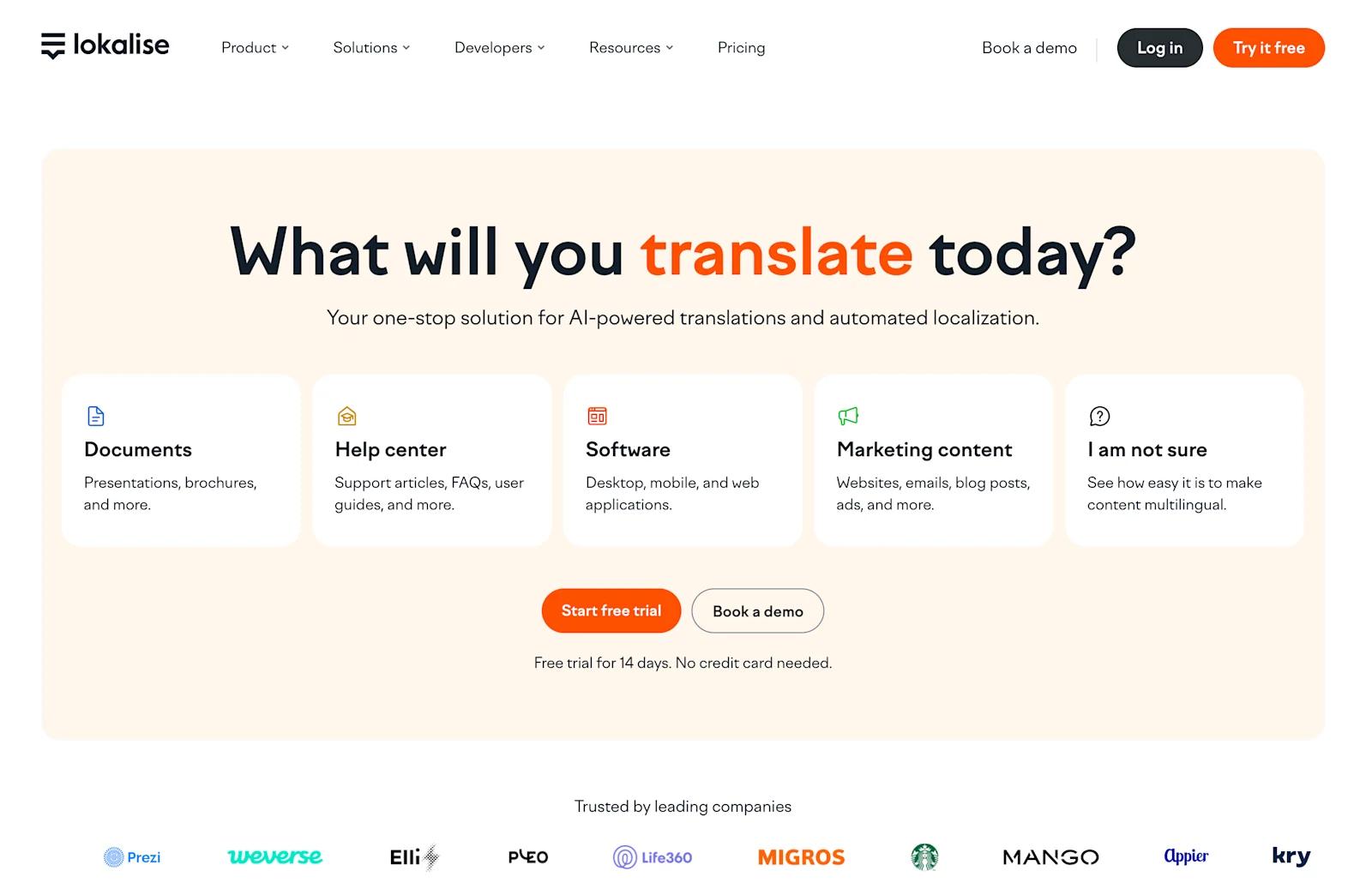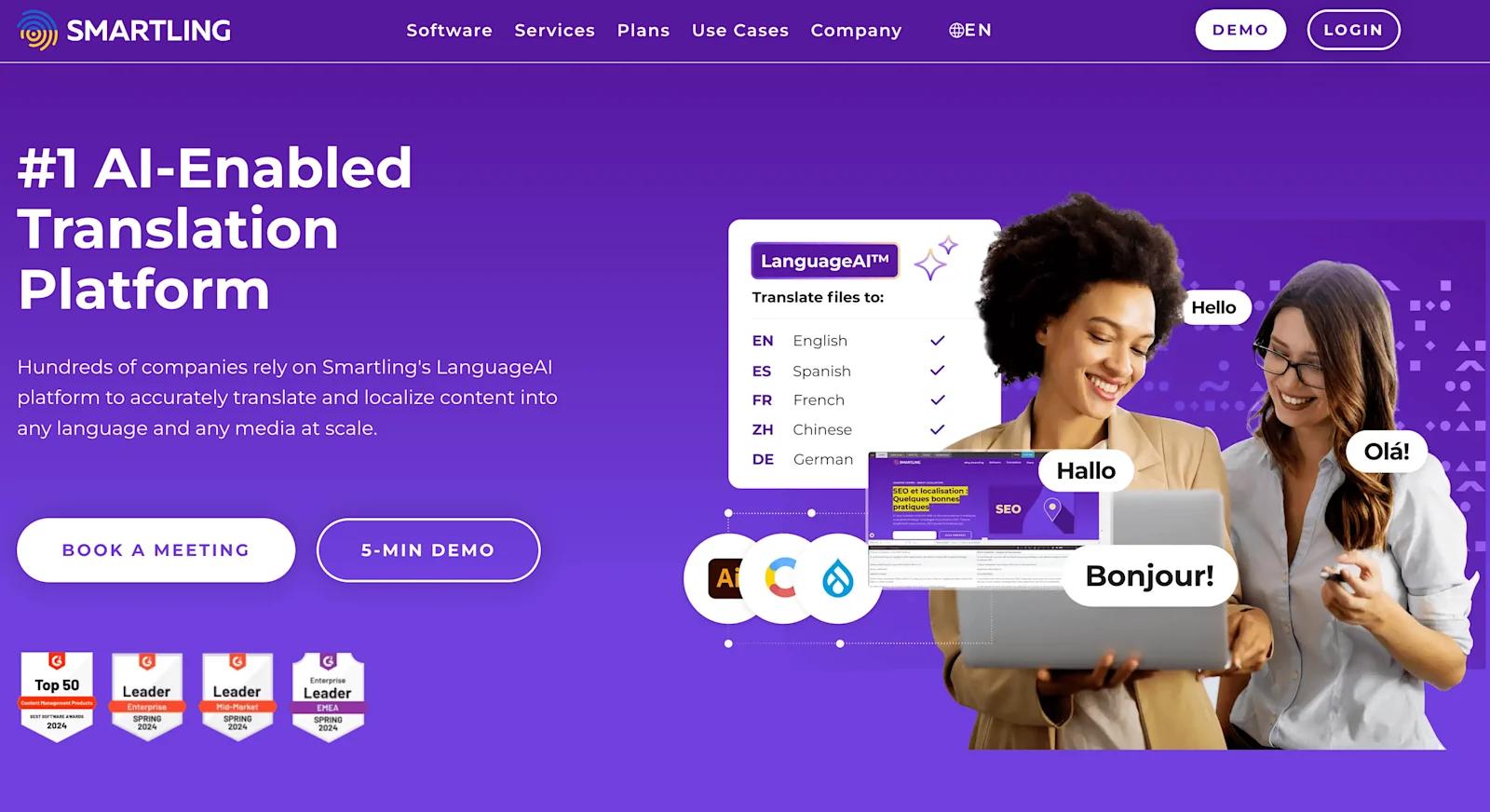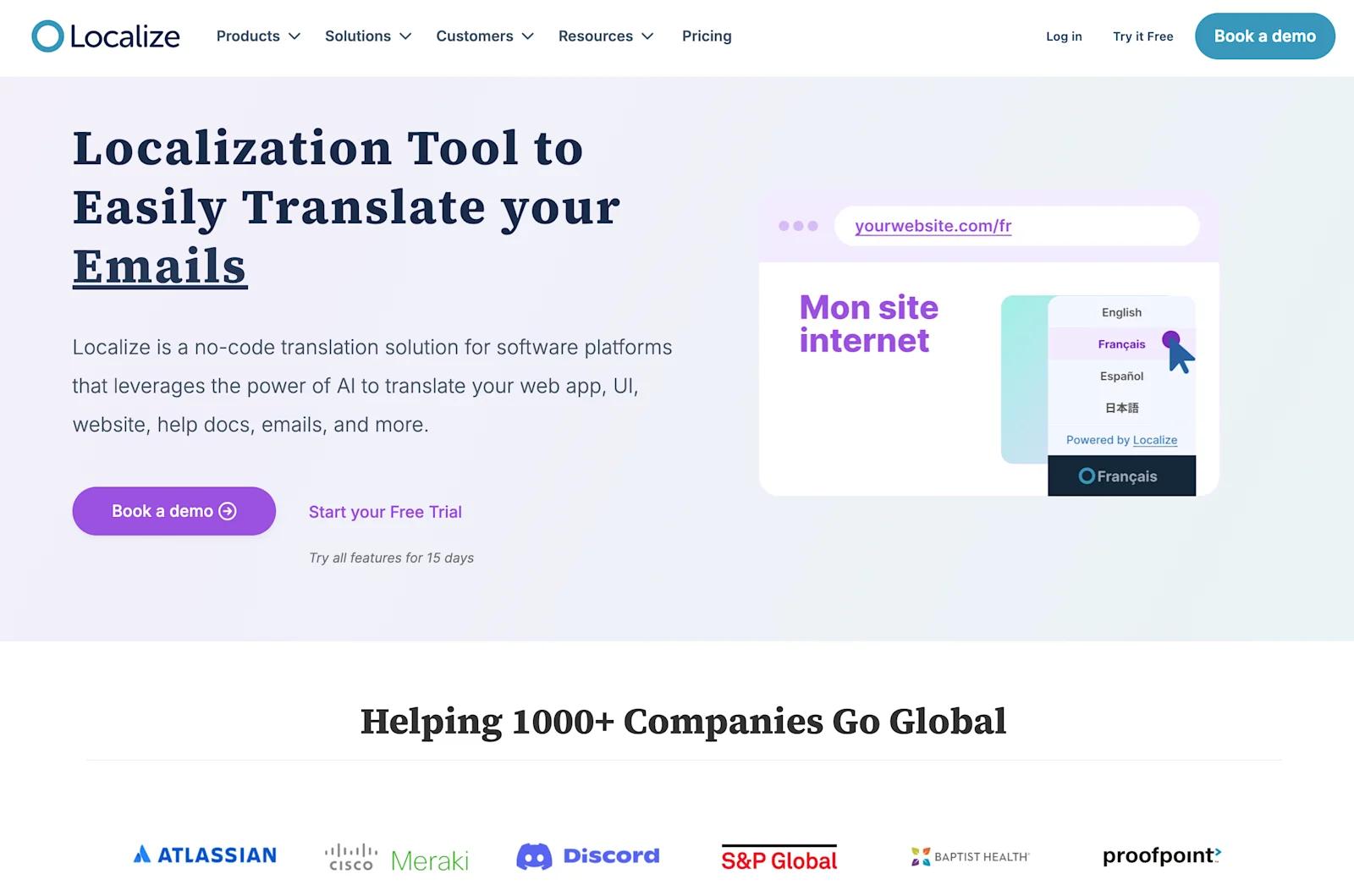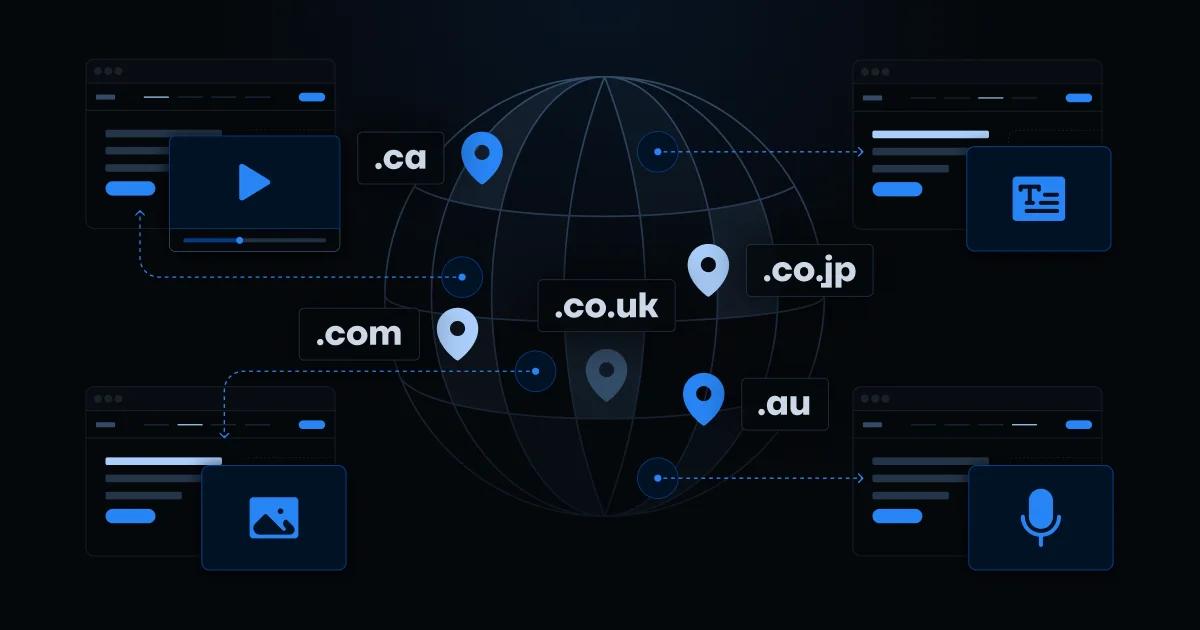Speaking directly to each market you serve is crucial for earning customers' trust and business. To reach diverse audiences and establish an international presence, you must support every market with a comprehensive library of translated content, graphics, resources, and marketing materials.
But how can you ensure your content resonates with local customers when it's stored within your content management system (CMS)?
CMS localization, the process of tailoring the content in your CMS to target specific markets, is a key solution. While human translation offers the most accurate results, machine translation provides fast, high-quality localization at scale. In fact, 39% of marketers report using Machine Translation (MT) as part of their localization strategy.
Localizing your CMS content opens opportunities to connect with customers worldwide and drive business growth.
In brief:
- CMS localization goes beyond translation, adapting content to cultural nuances and regional preferences.
- Choosing the right CMS with robust localization features is crucial for effective global outreach.
- Implementing a strategic localization approach enhances user engagement, SEO performance, and brand presence internationally.

What is CMS Localization?
A Content Management System (CMS) is a tool that allows businesses to organize, modify, and deliver digital content on the web. These user-friendly platforms enable non-technical individuals to manage a website's content effectively and efficiently.
However, for global organizations, simply translating content within a CMS is not enough. Localization is essential to ensure your content resonates with local audiences in each market.
Importance of Localizing Content for Global Audiences
Localizing content goes beyond mere translation. It involves adapting your website, marketing materials, and other digital assets to reflect the unique cultural nuances, language preferences, and regional expectations of your target audience.
- Cultural Relevance: Ensures imagery, idioms, and layouts are culturally appropriate.
- Enhanced Engagement: Personalizes content to make it feel more relevant to users.
- Market Expansion: Opens up new markets by overcoming linguistic and cultural barriers.
According to a study, 76% of consumers prefer to buy products with information in their native language, highlighting the importance of localization for global businesses.
5 Reasons Why Global Websites Need Localization
Having a strong online presence is crucial for businesses looking to expand their reach and tap into the global market. Only 26% of website users understand English yet nearly 64% percent of all websites use English as their content language. This excludes a huge proportion of potential customers.
However, simply translating your website content into multiple languages is not enough. To truly connect with customers around the world, your website needs to be localized - tailored to the unique preferences, cultural nuances, and linguistic requirements of each target market.
Here are five reasons why global websites need localization:
- 🌎 Expanding Market Reach: Localization enables your business to break down language barriers and connect with a wider audience. Providing content in the native languages of your target markets can expand your customer base and tap into new revenue streams across the globe.
- 👤 Enhancing Brand Identity: A well-executed localization strategy can help strengthen your brand identity and create a sense of trust and familiarity with your customers. Adapting your content and design to local preferences can create a more authentic and engaging brand experience that resonates with your target audience.
- 🧑💻️ Tailoring Web Experiences: Localization goes beyond just translating text; it involves customizing the entire user experience to match the expectations and preferences of your local customers. This can include adapting visual elements, payment methods, product information, and even the overall tone and messaging of your website.
- 🎯 Increasing Conversion Rates: Through providing a tailored, localized experience, you can improve customer satisfaction and increase the likelihood of successful conversions, such as product purchases, form submissions, or newsletter sign-ups. Localized content has been shown to significantly boost conversion rates in global markets.
- 🔍 Boosting SEO: Proper localization can also enhance your website's search engine optimization (SEO) performance in local markets. Optimizing content, URLs, and other technical elements for each language and region, you can improve your visibility in local search results and drive more organic traffic to your website.
Investing in CMS localization is a strategic decision that can pay dividends in the form of expanded market reach, enhanced brand identity, tailored web experiences, increased conversion rates, and improved SEO performance.
Through prioritizing localization, businesses can open the full potential of the global market and better serve their customers worldwide.
Best CMS Platforms for Localization

10 Best CMS for SaaS Companies (Startup to Enterprise)
When it comes to creating multilingual websites, the choice of content management system (CMS) can significantly impact the localization process.
While many CMS tools offer plugin functionality to facilitate the creation of multilingual content, a comprehensive localization strategy requires more than just language translation.
Headless CMS for Localization
Headless CMS platforms, such as Contentful and DatoCMS have become popular for localization due to their flexibility and scalability. These systems decouple content management from content delivery, allowing for greater control over multilingual content. Key benefits include:
- Flexible Content Management: Separate content management from delivery, making it easier to handle complex localization needs.
- Integration with Microservices: Seamlessly integrate with translation services and other microservices to streamline the localization workflow.
Traditional CMS for Localization
Traditional CMS platforms, like WordPress and Webflow also offer robust localization capabilities through built-in features and dedicated plugins. Notable options include:
- WordPress Plugins: Utilize translation plugins such as WPML and Polylang to simplify the creation and management of multilingual content.
- Native Support in Contentful: Provides comprehensive content localization support, making it suitable for organizations with detailed localization requirements.
Choosing the Right CMS
The decision between a headless CMS and a traditional CMS for localization depends on various factors:
- Content Velocity: How quickly you need to update and manage content.
- Development Workflows: The complexity and flexibility of your development processes.
- Granular Control: The level of detailed control you require over the localization process.
Ultimately, the best CMS platform for localization will depend on your organization's specific needs and requirements. Assessing these factors will help you choose a solution that ensures efficient, effective localization of your website content.

How to Adapt Content for Specific Locales
Adapting content for specific locales ensures your digital presence resonates globally. By tailoring your approach, you create a more engaging and relevant experience for users across different regions.
Strategies for Effective Content Customization
- Identify Content Elements to Localize: Focus on product descriptions, marketing materials, and support documentation.
- Utilize Field-Level Localization: Allows granular control without duplicating entries.
- Employ Fallback Languages and Data Inheritance: Streamlines the process, ensuring consistency and efficiency.
Cultural Adaptation Beyond Translation
True localization requires cultural adaptation.
- Human Translation: Maintains cultural sensitivity and context relevance.
- Adapt Imagery and Symbols: Ensures visuals are culturally appropriate.
- Adjust Local References: Tailors content to reflect local events and customs.
Integrating CMS with Localization Platforms
Integrating a robust localization platform into your CMS can streamline managing multilingual content.
Benefits of Integration
- Automated Workflows: Speeds up the translation process.
- Consistency: Maintains uniformity across all languages.
- Quality Control: Ensures translations are accurate and contextually appropriate.
Popular Localization Platforms
- Lokalise: A cloud-based platform that simplifies the translation process with real-time collaboration and automated workflows.
- Smartling: Offers advanced translation workflows and AI-powered translation capabilities.
- Crowdin: Provides seamless integration with existing CMS for efficient translation management.
Planning a Successful Localization Strategy
Planning a successful localization strategy is key to expanding your digital presence globally. Evaluate several factors influencing the effectiveness of your CMS localization approach.
Crucial Considerations for CMS Localization
- Choose the Right CMS: Ensure it supports robust multilingual features.
- Integration Capabilities: Look for seamless integration with Translation Management Systems (TMS).
- User-Friendly Interface: Facilitates ease of use for content managers.
- SEO Optimization: Helps rank well across languages and markets.
Audience Research in Localization Strategies
Understanding your audience is vital.
- Identify Target Languages and Regions: Through engagement data and market research.
- Analyze Cultural Nuances: Tailor content to align with local customs and preferences.
Other Localization Software
While content management systems (CMS) may offer basic translation functionalities, dedicated localization software solutions provide more advanced features and capabilities to streamline the localization process.
Tools like Lokalise, Smartling, and Localize are prominent players in the translation management systems market, offering automated translation workflows and seamless integration with various content platforms.
Lokalise

lokalise
Lokalise is a cloud-based localization software that simplifies the translation process for businesses. It offers a range of features, including real-time collaboration, automated translation, and continuous localization, enabling teams to manage their content localization efficiently.
Lokalise integrates with popular CMS platforms, project management tools, and development platforms, ensuring a smooth localization workflow.
Smartling

smartling
Smartling is a translation management system that helps organizations translate and localize their digital content. It features a user-friendly interface, advanced translation workflows, and AI-powered translation capabilities.
Smartling's integration with leading CMS platforms, such as WordPress and Drupal, allows businesses to streamline their localization efforts and maintain brand consistency across multiple markets.
Localize

localizejs
Localize is a translation management platform that specializes in providing localization solutions for global businesses. It offers features like automated translation, content management, and advanced reporting, helping organizations efficiently manage their localization projects.
Localize's integration with various CMS platforms and its ability to handle complex language requirements make it a popular choice for companies seeking a comprehensive localization software solution.
These localization software tools can help businesses overcome the challenges of managing content translations and adaptations, ensuring high-quality, consistent, and timely localization across their global web presence.
Key Features to Look for in a CMS for Localization
When selecting a content management system (CMS) to support your global expansion efforts, it's important to prioritize features that facilitate seamless content translation and adaptation to specific markets.
Some key features to consider include:
Multi-Language Support
The CMS should provide strong multi-language support, allowing you to easily manage content in various languages. Currently, 89% of marketers working for medium-to-large companies plan to localize their content in the next year.
This ensures your website and digital assets can be presented in the native tongues of your target audiences, fostering better engagement and user experiences. 76% of people prefer to buy products with information in their native language whilst 40% will never buy from a website in another language.
Regional Settings and Customization
Localization goes beyond just translating text - it also involves aligning your content and user interface with regional preferences, customs, and cultural nuances.
Look for a CMS that offers extensive customization options to tailor the experience for each local market.
Content Versioning and Management
Maintaining version control and centralized management of your localized content is crucial.
The right CMS should offer strong tools for versioning, collaboration, and streamlined updates across multiple language editions of your website or digital properties.
Integration with Translation Services
Integrating your CMS with professional translation services can significantly accelerate and optimize the localization process. Seek out a platform that seamlessly connects with leading translation providers, enabling efficient content workflows and maintaining translation quality.
SEO and URL Structure Optimization
the average SEO campaign generates 1000% more traffic than the average social media campaign. To ensure your localized content is easily discoverable in target markets, your CMS should offer advanced SEO features and the ability to optimize URL structures for specific languages and regions.
This helps boost the visibility and accessibility of your global web presence. Prioritizing these key features when evaluating CMS platforms can lay the foundation for successful content localization and global expansion.

Steps to Implement CMS Localization
Implementing a successful CMS localization strategy involves a multi-faceted approach. By following these key steps, businesses can effectively adapt their content management systems to cater to global audiences and open up new growth opportunities.
1. Assess Your Localization Needs
Evaluate Target Markets: Identify the languages, regional settings, and cultural nuances essential for your global expansion goals.
Determine Content Requirements: Assess which content needs to be translated and localized.
2. Choose the Right CMS and Tools
Select a CMS Platform: Opt for a CMS that offers localization features such as multi-language support, content versioning, and integration with translation services.
Complement with Localization Tools: Use specialized localization tools to streamline translation and localization processes.
3. Plan and Structure Your Content
Content Architecture: Design your content architecture, navigation, and layout to accommodate different languages and cultural preferences.
Seamless Localization: Ensure your website content is structured to facilitate seamless localization.
4. Implement Translation and Localization Processes
Establish Workflows: Set up efficient workflows for translating and localizing your content.
Combine Resources: Use a mix of human translators and automated solutions to deliver high-quality, culturally relevant content to international audiences.
Following these steps means that businesses can effectively implement CMS localization and open up the full potential of their global websites.
Challenges and Solutions in CMS Localization
Localizing your content management system is crucial for delivering a seamless, compatible user experience to your global audience.
However, businesses often face a myriad of challenges in this process, ranging from managing consistent branding across markets to ensuring quality and accuracy in translations.
Managing Consistent Branding Across Markets
Maintaining a consistent brand identity can be a significant challenge when localizing your CMS. Subtle differences in language, cultural nuances, and design preferences can make it difficult to preserve the essence of your brand while adapting to local preferences.
To overcome this, businesses should establish clear branding guidelines, collaborate with local teams, and make use of centralized content management tools to ensure a cohesive brand experience across all markets.
Handling Complex Language Requirements
Navigating the complexities of language can be a daunting task in CMS localization. From accommodating right-to-left scripts to addressing character limitations, businesses must be adaptable in their approach.
Investing in linguistic expertise, utilizing translation memory tools, and establishing flexible content structures can help businesses overcome these challenges and deliver a seamless experience for users.
Ensuring Quality and Accuracy in Translations
Maintaining the quality and accuracy of translations is crucial for effective CMS localization. Inaccurate or culturally insensitive translations can undermine your brand's credibility and alienate your target audience.
To address this, businesses should collaborate with professional translators, implement quality assurance processes, and use AI-powered translation tools that can adapt to regional nuances.
Keeping Up with Regional SEO Practices
Effective CMS localization requires businesses to stay abreast of regional SEO practices, as search engine optimization varies significantly across different markets.
From understanding local keyword trends to optimizing URL structures, businesses must be proactive in their approach to ensure their content is discoverable and accessible to their target audiences.
Addressing Technical and Integration Issues
Integrating localization capabilities into your CMS can present various technical challenges, from managing multilingual content databases to ensuring seamless integration with translation services.
Businesses should carefully evaluate their CMS options, establish content management workflows, and collaborate with technical experts to address these integration issues and ensure a smooth localization process.
Our Take on CMS Localization
As web design experts at Webstacks, we've seen firsthand the transformative power of effective CMS localization.
Why CMS Localization Matters
In today's globalized market, customers expect personalized experiences that speak directly to them. CMS localization is not just a technical adjustment—it's a strategic move to connect authentically with your audience.
How Webstacks Can Help
- Strategy Development: Crafting comprehensive localization strategies tailored to your business.
- Technical Implementation: Integrating the right CMS and localization tools for seamless operations.
- Ongoing Support: Providing insights and adjustments as you expand into new markets.
Conclusion
CMS localization has emerged as a crucial strategy for businesses seeking to expand their global reach and engage with diverse audiences.
Localizing the content within your content management system (CMS) can create personalized user experiences that resonate with customers in your target markets, enhancing your brand identity, improving search engine visibility, and driving increased revenue.






